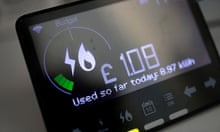Carbon emissions from the global electricity sector may peak this year, after plateauing in the first half of 2023, because of a surge in wind and solar power, according to a climate thinktank.
A new report on global electricity generation found that the growth of renewables was so rapid that it was close to the incredibly fast rate required if the world is to hit the tripling of capacity by the end of the decade that experts believe is necessary to stay on the 1.5C pathway.
It also noted that there had been only a slight increase in emissions in the first six months of the year, compared with the same period a year before.
The findings suggest the world may be close to reaching the peak of the global power sector’s carbon emissions, and they could soon even begin to fall in line with global climate targets.
The report, by the climate thinktank Ember, compared electricity data from January to June 2023 to the same period last year, across 78 countries representing 92% of the world’s electricity demand.
Malgorzata Wiatros-Motyka, Ember’s senior electricity analyst and the lead author of the report, said: “It’s still hanging in the balance if 2023 will see a fall in power-sector emissions.”
“The world is teetering at the peak of power-sector emissions, and we now need to unleash the momentum for a rapid decline in fossil fuels by securing a global agreement to triple renewables capacity this decade,” she said.
The report found that global power-sector emissions rose by 0.2% in the first half of the year compared with the same period last year.
However, it also found that wind and solar power had climbed to a combined total of 14.3% of the world’s electricity, up from 12.8% last year.
Solar power in particular grew by 16% in the first half of the year, compared with the first six months of 2022, after 50 countries set new monthly records for solar generation, according to Ember.
Wiatros-Motyka told the Guardian that tripling the world’s renewable energy capacity was the “single biggest action that governments can take to put the world on a course for a 1.5C-aligned pathway”.
Carbon emissions from generating electricity need to fall to net zero by 2045 globally, and by 2035 in advanced economies, in order to reach the Paris agreement’s goal of limiting the rise in global temperatures to 1.5C above pre-industrial levels, according to modelling by the International Energy Agency (IEA).
The IEA’s influential net zero roadmap suggests that the combined share of solar and wind power would need to increase from 12% last year to 40% in 2030 to remain on track.
To achieve that, global renewable capacity would have to triple by the end of the decade, which would require solar power to grow by 26% every year, while wind power would need to grow by 16% a year.
“To put this in context, last year’s year-on-year growth was 25% for solar and 14% for wind, so almost exactly what is needed,” said Wiatros-Motyka. “Rapid growth in solar and wind has so far kept pace with pathways aligned with 1.5C. But to keep up these high growth rates throughout this decade, countries need to deploy bigger and faster.”
Fossil fuels were also kept at bay by a global slowdown in the world’s growing demand for electricity, according to the report. It found that global electricity demand rose by 0.4% in the first half of 2023 compared with the same period last year, well below the 10-year average of 2.6% before that.










